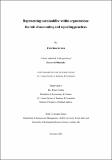| dc.description.abstract | The aim of this thesis is twofold. The first aim of this thesis is to explore the role of accounting and reporting practices as organizations attempt to represent sustainability. Second, this thesis aims to explore how individuals engage with accounting and reporting practices to make sustainability meaningful as organizational discourses unfold.
By relying on the theoretical insights offered by studies on discourses analysis, (and particularly on Hardy, C., Palmer, I., and Phillips, N., (2000), “Discourse as a Strategic Resource”, Human Relations, Vol. 53 No. 9, pp. 1227-1248), this research interprets ‘sustainability’ as a ‘discursive concept’ that does not have a fixed meaning and can be moulded into practice through its continuous interplay with the objects it is attached to (i.e. accounting and reporting practices) and the subject positions that are involved in their production.
By exploring the case of LOGIC, a large international oil and gas company operating in more than 70 countries worldwide, this study analyses the evolution of discourses concerning sustainability, as well as changing accounting and reporting practices, with a particular focus on integrated reporting.
Whereas the majority of prior studies have discussed ways for addressing the gap between what companies say and what they actually do about sustainability, accounting and reporting practices are not expected to offer complete representations of organizations’ performance of sustainability. Rather, this study maintains that accounting and reporting practices contribute to making sense of, and representing, sustainability by “closing-down” this complex and unknown concept to more manageable and known categories. In particular, this study maintains that accounting and reporting practices “open up” a discursive space, between juxtaposing interpretations of sustainability that facilitate the construction and reconstruction of the meaning of sustainability throughout the process of representing.
In doing so, accounting and reporting practices play a role as discursive objects enabling individuals to connect their own concepts and understanding of sustainability to specific texts. At the same time, accounting and reporting practices unfold themselves, and evolve, as a consequence of the debates about sustainability that their production generates. | en_IE |


